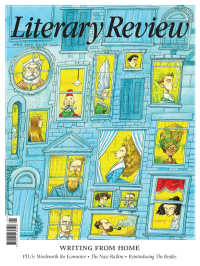Joanna Bourke
Victims without Borders
Our Bodies, Their Battlefield: What War Does to Women
By Christina Lamb
William Collins 416pp £20
Some books are painful to read. This one is guaranteed to break hearts. It tells the stories of dozens of girls and women who have been raped in conflicts throughout the world. Readers will have to brace themselves for an onslaught of pain, terror and anguish. Female suffering is exposed and emotions are laid bare.
Christina Lamb is a distinguished reporter with over thirty years’ experience as a foreign correspondent. She knows how to evoke colours, sounds and smells; she is also acutely sensitive to the individual cadences in the speech of the women she interviews – their hesitations and colloquialisms, as well as the urgency with which they seek to find people willing (and able) to listen to their life stories. Lamb is a close listener who knows how to frame their accounts in ways that will elicit the desired response from her readers. That response is despair.
Anger, too, plays a large part in this book. Lamb is critical about the state of war reportage, which often ends up being ‘men writing about men’. The lack of women’s stories in war reporting is not only due to the fact that most people don’t want to hear about

Sign Up to our newsletter
Receive free articles, highlights from the archive, news, details of prizes, and much more.@Lit_Review
Follow Literary Review on Twitter
Twitter Feed
Russia’s recent efforts to destabilise the Baltic states have increased enthusiasm for the EU in these places. With Euroscepticism growing in countries like France and Germany, @owenmatth wonders whether Europe’s salvation will come from its periphery.
Owen Matthews - Sea of Troubles
Owen Matthews: Sea of Troubles - Baltic: The Future of Europe by Oliver Moody
literaryreview.co.uk
Many laptop workers will find Vincenzo Latronico’s PERFECTION sends shivers of uncomfortable recognition down their spine. I wrote about why for @Lit_Review
https://literaryreview.co.uk/hashtag-living
An insightful review by @DanielB89913888 of In Covid’s Wake (Macedo & Lee, @PrincetonUPress).
Paraphrasing: left-leaning authors critique the Covid response using right-wing arguments. A fascinating read.
via @Lit_Review